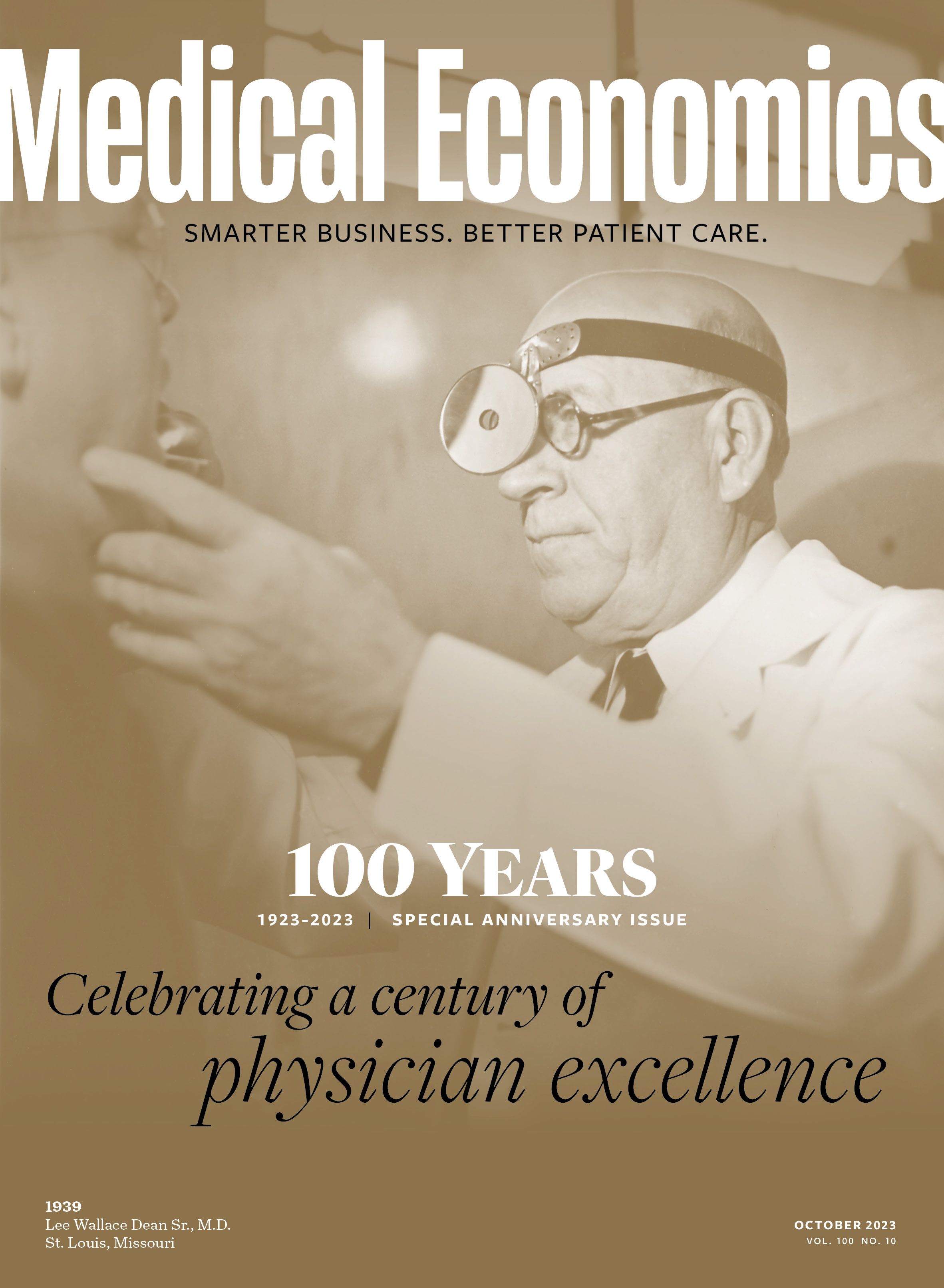Publication
Article
Medical Economics Journal
Celebrating 100 years of serving physicians
Author(s):
For a publication to survive and thrive for a century puts us in rarified air. How do you celebrate such an event?
Mike Hennessy Jr.

It was 100 years ago that H. Sheridan Baketel, M.D., sat in an office on Broadway Avenue in New York City and wrote these words, the opening sentence of his salutatory column as editor of the first issue of a new business magazine for doctors called Medical Economics:
“The physician is ordinarily regarded as an indifferent business man who, in the race of life, suffers economically because of his business ineptitude.”
Ouch.
It is an old cliché that physicians are bad at business; that they are focused first on completing the rigorous gauntlet of medical school and residency, and then on the needs of their patients, with business considerations falling by the wayside. That is not exactly true. Of course, some physicians are better business leaders and entrepreneurs than others. But a century later — after publication of more than 1,000 print issues of Medical Economics and the later advent of a website, podcasts, video programs, events and webinars — we like to think that we have contributed a great deal to the business savvy of hundreds of thousands of physicians.
For a publication to survive and thrive for a century puts us in rarified air. How do you celebrate such an event? We decided to celebrate you, our current physician readers and all those who have come before, and to thank you for a century of service to your patients. For this special issue, we put the focus on the calling of the physician: how it has changed in the past century and how it is changing still.
Inside, we have a robust and visually inventive timeline that will take you through medical history. Our Cover Story focuses on how the changes of the past century have transformed primary care and what it means to be a physician. In another feature, we delve into the medical and technological breakthroughs that have advanced how physicians make diagnoses and treat patients. We examine how the physician-patient relationship was defined and has evolved into what it is today. We take a fun look at our favorite TV doctors, and how physicians have influenced — and been influenced by — pop culture. We explore the demographics of who earns the title of physician. We also speculate on the future, and what the decades to come have in store for physicians.
To help us create this issue, our editors asked you earlier this year what Medical Economics has meant to you over the years. We received many kind words that prove the brand’s positive impact on generations of physicians. Many of you told us about how your grandfathers and fathers read the magazine, and now you do too. Some have written for us in the past and provided kind words about the pride you felt seeing your name in print. Others shared stories about thumbing through the pages searching for insight when faced with a vexing practice management challenge or a thorny employment contract negotiation. For a magazine sometimes semiderogatorily referred to as a nonpeer-reviewed “throwaway,” we often hear from many of you who have kept dozens of issues as keepsakes over the years.
Finally, anniversaries are times for reflection, and sometimes you wonder whether you have strayed from your mission. Have we stuck to our core mission, tending to the business needs of physicians?
So, our editors dug into our dusty archives — including a copy of the inaugural October 1923 issue and a weathered binder filled with the yellowing letters to the editor that were mailed to the magazine over the decades — and took a trip down memory lane. In that first issue, Baketel outlined three areas that Medical Economics would focus on. Here is what he wrote:
“It is the hope of the progenitors of Medical Economics to present to the physician each month a journal whose contents will materially aid the practitioner in the conduct of his professional and business affairs.” The topics covered would fall into three groups:
- The development and conduct of practice.
- The collection of accounts.
- The investment of earnings.
I am guessing those sound familiar to our readers, and I am proud to say it’s what still drives us.
In wrapping up his first column, Baketel focused on how the goal of Medical Economics is to direct the reader’s attention “to the practical side of the doctor’s life, with a view to his present needs and to preparedness for the future of himself and of those dependent upon him.” I couldn’t agree more.
MJH Life Sciences acquired Medical Economics in 2019; my father and MJH Founder Mike Hennessy Sr. was thrilled to add this historic brand to our roster of leading medical journals, and our mission is to continue to serve you, our physicians, with the business content you need to excel.
We aren’t stopping at a century. This brand is strong, and the challenges you face in your businesses and personal finances are fierce. Our pledge is to continue to serve you under the mission Baketel established in 1923.
We hope you enjoy this issue. Thank you, as always, for reading.
Mike Hennessy Jr. is the President and CEO of MJH Life Sciences.




